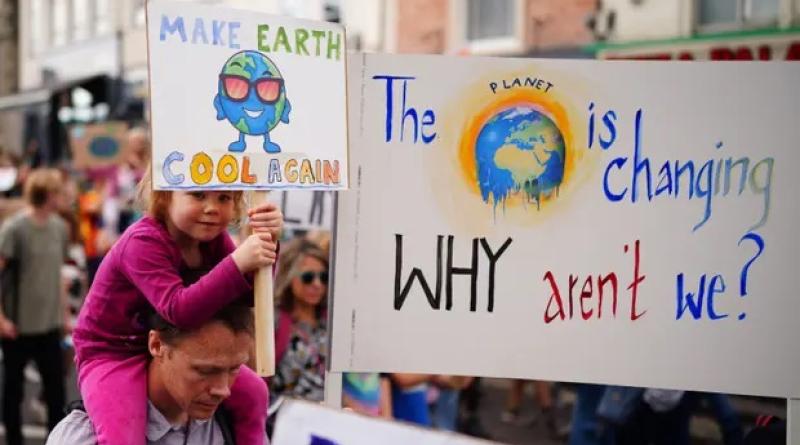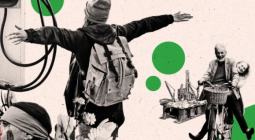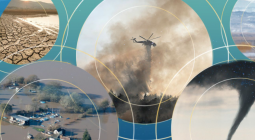The IPCC climate report is grim – but there is still room for hope

There is only a small window in which to mitigate the worst effects. So make a change now, and make it one you can stick to
If the prospect of nuclear war wasn’t enough, the Intergovernmental Panel on Climate Change (IPCC) picked this week to drop its latest report on the state of the climate crisis.
The key findings are bleak, if familiar. Climate breakdown is accelerating rapidly; many of the impacts will be more severe than predicted. Nowhere will be spared. “The scientific evidence is unequivocal: climate change is a threat to human wellbeing and the health of the planet,” said Hans-Otto Pörtner, a co-chair of the working group producing this report. These health impacts are physical – increased chance of dengue fever, for example, or cardiovascular disease – but also mental: the suffering of living through storms, famine, heat stress, and the loss of homes and cultures.
The UN secretary general, António Guterres, described the report as an “atlas of human suffering”, and it’s vital we remember that this suffering isn’t evenly distributed. In highly vulnerable countries, mortality from climate impacts is already 15 times higher than in some others. Despite being key to political questions of climate justice and climate financing more often than not, those most at risk are those who have the least historical responsibility for causing the problem.
It’s clear that climate breakdown is not only here, it has been for a while. When the IPCC first started putting together these reports in the late 1980s, climate impacts were already being felt, but it still felt a bit far off, a problem for the future. Today, increasing numbers of people around the world have lived with the climate crisis their entire lives. It’s not just our now and tomorrow, but our yesterday too.
Over the years the IPCC has been accused of pulling its punches, sticking to cold scientific language as a way to avoid overstepping into the realm of politics, which has been misconstrued as playing down the issue at hand. This push and pull between science and politics has haunted the IPCC ever since its inception. It’s the result of the partnership between two scientists – Bert Bolin and Mostafa Tolba – who were aiming to build on climate policy discussions that had rumbled on since the 1950s. They disagreed slightly on the role of scientists as advocates in such work. Tolba opened one of the first meetings with a powerful speech warning about future disasters if the world didn’t act promptly. The speech apparently worried Bolin slightly; scientists weren’t campaigners.
If this was a problem in the past, the IPCC is clearly keen to present the world with a powerful warning now. The report is scientific, yes, with the numbers and notes on degrees of confidence you’d expect, but with a clear conclusion: we are living that nightmare-scenario future that scientists in the 20th century warned us about. “Any further delay in concerted global action will miss a brief and rapidly closing window to secure a liveable future,” said Pörtner.
Not only are we on course for loss and suffering, many have lost and suffered a lot already, and some things are already gone for ever. As John Kerry, the US special presidential envoy for climate, put it: “The question at this point is not whether we can altogether avoid the crisis – it is whether we can avoid the worst consequences.” Emotionally speaking, it’s entirely appropriate to grieve for, as well as fear, climate impacts.
We need to let ourselves feel that climate pain every now and again, but we can’t let ourselves be consumed by it. If we give in to doom completely, we only give in to the worst-case scenarios coming true. Plus, as the new report emphasises, every bit of a degree celsius matters – there is still so much we can save. I know climate campaigners always say this, but now really is the time for action.
The best antidote to climate fear is always climate action, so roll up your sleeves and get to work. Not sure where to start? Do something that brings you joy. You’ll be at your most powerful and your most infectious. Climate change is grim, plain and simple. But taking action on it can be an absolute ball. You’ve got a range of options – you can work to help us quit fossil fuels, or shift what we eat and buy to get greenhouse gases down. We can call on governments to act faster to get us to net zero through moving to renewable energy and making our homes and transport more energy-efficient. We can plant trees and pursue other nature-based solutions. But we will also need to live with the changes that are already here. That means campaigning on a whole host of issues that might not immediately seem climate-related, too: migration, housing, poverty and mental health provision.
The storms are here, and more are coming. We have to be ready for them.
-
Alice Bell is co-director at the climate change charity Possible and author of Our Biggest Experiment: A History of the Climate Crisis
cover photo: A climate protest in Bristol, September 2021. Photograph: Ben Birchall/PA






